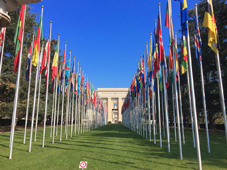
The 47th Geneva International Discussion took place on the 3rd of April.
By Inga Kakulia
Friday, April 5
The 47th Geneva International Discussion took place on the 3rd of April.
The Press Communique issued by the OSCE states that according to Co-Chairs the security situation on the grounds had been challenged especially by the death of Georgian citizen, Irakli Kvaratskhelia in the custody of Russian Federation Border Guards in the Gali district on March 2019.
The Working Group I was chaired by the UN Representative Cihan Sultanoglu and the Special Representative of the OSCE Chairperson-in-Office Rudolf Michalka and EU Special Representative, Toivo Klaar.
According to the statement of The Foreign Affairs Ministry of Georgia, The Georgian Delegation sharply raised the issue of security and humanitarian problems in the occupied regions of Abkhazia and Tskhinvali as well as along the line of the occupation and the people who live there. They talked extensively about the illegal occupation and the harsh consequences of the factual annexation process. The Georgian delegation stressed that the constant militarization, as well as the ongoing military training, contribute to the destabilization not only of Georgia but the whole region.
Extra attention was paid to the practice of illegal arrests and kidnapping of the local inhabitants by the Russian Security Forces, as well as barbed wiring of the occupation border and placement of different artificial barriers that prevent the locals from accessing their lands and intensifies the tension in the region.
The Georgian delegation once again stressed the importance of seeking justice for Davit Basharuli, Giga Otkhozoria, and Archil Tatunashvili’s murders.
In addition, co-chairs and participants from the US and Georgia expressed concern due to the death of Irakli Kvaratskhelia in the Russian military base. The Georgian participants requested detailed information with the purpose of determining the objective circumstances of the death of a Georgian citizen.
Regarding the death of Kvaratskhelia, the Co-Chairs called on the relevant participants to share all existing information in a timely manner.
On the restrictions and closures, the Co-Chairs and Co-Moderators reiterated that these measures were not justified as a means of providing public health benefits. They stressed that both the Incident Prevention and Response Mechanisms (IPRMs) and the hotlines should have been used.
The immediate need for restoring the Incident Prevention and Response Mechanisms was highlighted by the delegates of Georgia. The co-chairs noted the need for the effective and efficient functioning of these mechanisms.
Co-chairs, as well as participants from the US and Georgia, talked about the severe humanitarian consequences of the shutdown of the occupation line in the regions of Abkhazia and Tskhinvali in January-February. Participants from Georgia raised the issues related to the restriction of free movement, prohibition of education in the native language, ethnic discrimination, and other fundamental rights violations of a local population. This context emphasized the hard situation of the Georgian population of Gali and Akhalgori and the harassment on ethnic grounds. The participants emphasized the active Russification process, which is a deliberate attack on the identity of the local population. The ecological problems were also discussed, namely, the spread of various harmful insects, that significantly damages the hazelnut and other agricultural crops and adversely affect the socio-economic conditions of the local population.
A significant part of the discussion was dedicated to underlining the importance of implementation of the 2008 Ceasefire Agreement on Russia’s part.
The Georgian participants stressed that by continuing the illegal military presence, Russian Federation continues to use force against the state of Georgia, which once again underlines the need to confirm and fulfill Moscow's commitment to non-use of force. In order to ensure this, the representatives of Georgia stressed the need to establish security mechanisms in Abkhazia and the Tskhinvali regions and the necessity of withdrawal of Russian occupation forces from Georgia.
Participants exchanged views on the agenda item - “non-use of force and international security arrangements,” benefiting from a corresponding information session.
According to the Press Communique, In Working Group II, the participants reviewed the humanitarian situation on the ground, including the impact of the temporary restrictions and closures of crossing points. They also discussed issues relating to documentation, freedom of movement, missing persons, public health, education, livelihoods, and environmental challenges.
Representatives of Russia and its occupational regions once again demonstrated their destructive approach. During the discussion of one of the most important topics in the agenda, The issue of a safe and dignified return of internally displaced persons and refugees from Abkhazia and Tskhinvali regions, the representative from Moscow, Sokhumi, and Tskhinvali left the negotiations, in order to avoid the discussion. Because of this, this topic could not be properly addressed. The Co-Chairs and Co-Moderators renewed their call for participants to engage constructively on all agenda items.
Russia has also released a statement after the Geneva International Discussion took place.
According to the statement “Regular exercises with the participation of members of the North Atlantic Alliance on the territory of Georgia are openly provocative. In this context, three delegates emphasized the need for a joint statement on non-use of force. However, the counter-productive position of the Georgian side has further hampered the issue”.
The next round of negotiations will be held on July 2-3, 2019.

